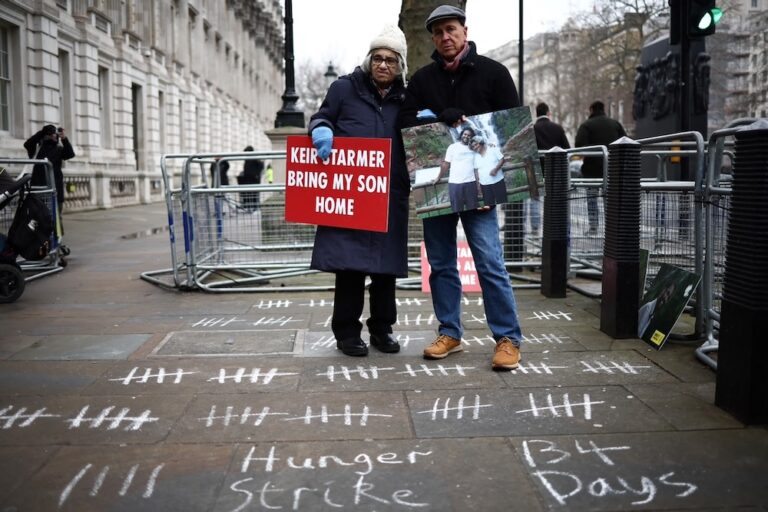(EOHR/IFEX) – The following is an EOHR press release: Preventive detention threatens journalists again The Egyptian Organization for Human Rights (EOHR) has followed with deep concern the questioning by the State Security Prosecution of Abbas Al-Tarabily, editor-in-chief of the Al-Wafd newspaper, the mouthpiece of the Al-Wafd opposition party, and Mohamed Abdel-Aleem, a journalist with the […]
(EOHR/IFEX) – The following is an EOHR press release:
Preventive detention threatens journalists again
The Egyptian Organization for Human Rights (EOHR) has followed with deep
concern the questioning by the State Security Prosecution of Abbas
Al-Tarabily, editor-in-chief of the Al-Wafd newspaper, the mouthpiece of
the Al-Wafd opposition party, and Mohamed Abdel-Aleem,
a journalist with the same newspaper. They were summoned in connection
with accusations of publishing false information harmful to public peace
and interests, inciting public opinion, and inciting public servants to
leave work or abstain from performing their duties. These accusations
were made in connection with a report by the State Security
Investigations (SSI) about a story that appeared on the newspaper’s
front page last Friday, 5 February, concerning strikes staged by workers
of the public works sector and a number of governmental agencies. The
two journalists were released on bail of LE 500 each.
On 6 February 1999, Al-Wafd newspaper reported to the EOHR that, on the
basis of an SSI report, the State Security Prosecution had summoned
journalist Mohamed Abdel-Aleem for questioning. At dawn on the same day,
an SSI force went to his house and took him to the State Security
Prosecution. During the interrogations, he denied the charges brought by
the prosecution and asserted that the published story was true and well
documented by accompanying photographs. In addition, he argued that the
story had been published by many other newspapers. However, he was
released on a bail of LE 500 pending investigations. Nevertheless, on 8
February, Abbas Al-Tarabily, Al-Wafd’s editor-in-chief, was summoned for
questioning on the same charges brought against Mohamed Abdel-Aleem.
During the interrogations, Al-Tarabily asserted the veracity of the
story and stressed that none of the concerned bodies had denied what was
published by Al-Wafd and the other newspapers. He added that the story
was published as a warning for fear that the situation would worsen.
The EOHR believes that the legal provisions upon which the two
journalists were interrogated, i.e. Articles 124A and 102 bis of the
Penal Code, should not, by any means, be applied against journalists.
These articles are only applicable in crimes such as the distribution of
leaflets, but not for publication offenses. With respect to journalists,
Press Law No. 96 of 1996 is applied as a general rule. Article 41 of
this law states that journalists shall not be placed in preventive
detention in connection with offences committed by newspapers, except in
case of offense against the President of the Republic. Hence, the
release of the two journalists on bail constitutes an erosion of the
legal safeguards afforded to journalists.
The EOHR also believes that the procedure and the accompanying charge
brought against Al-Wafd’s editor-in-chief aim at circumventing a ruling
issued by the Supreme Constitutional Court on 5 February 1995. This
ruling stated that editors-in-chief shall not be held liable for items
they had not written themselves. The EOHR affirms that these procedures
constitute gross violations of the freedom of opinion and expression and
the right to circulate information. They also contravene Egypt’s
international commitments as a signatory to the International Covenant
on Civil and Political Rights, which states in Article 19, second
paragraph: “Everyone shall have the right to freedom of expression; this
right shall include freedom to seek, receive and impart information and
ideas of all kinds, regardless of frontiers, either orally, in writing,
or in print, in the form of art, or through any other media of his
choice.”
The EOHR is deeply concerned about this case and announces its
solidarity with the two journalists. In addition, it appeals to the
authorities to review all legal provisions that are inconsistent with
the Press Law. It also urges all civil society institutions, syndicates,
particularly the Press Syndicate, political parties, and intellectuals
to intervene to confront such freedom-restricting measures. Finally, it
appeals to the Egyptian government to abide by its international
commitments and fulfill its responsibility for protecting all freedoms;
and to take prompt measures to stop all practices that curb freedom of
opinion and expression and the right to receive and impart information.


